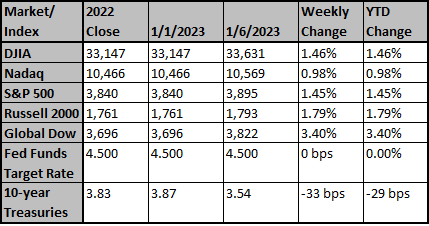Not long after Friday’s Employment Report multiple analysts and commentators were calling it a “goldilocks” report, by which they meant it showed that the economy was neither “too hot” nor “too cold,” but instead, “just right.”
In turn, the theory goes, the Federal Reserve could stop raising short-term rates earlier and at a lower peak than previously expected, inflation would continue to cool, and the economy could pull-off an elusive “soft landing.”
The biggest headlines from the Employment Report were definitely good news. Nonfarm payrolls rose 223,000 in December, beating the consensus expected 203,000. Meanwhile, civilian employment, an alternative (although volatile) measure of jobs that includes small-business start-ups, surged 717,000. Rapid job creation helped push the unemployment rate down to 3.5%, tying the lowest level since Joe Namath was a reigning Super Bowl champion. (If you’re a Millennial or Gen Z, yes, that’s the same guy in the Medicare commercials.)
But, behind the headlines, the data was not as good. Temporary help service jobs (temps) fell 35,000 in December, the fifth straight monthly decline, to a level of temp jobs below a year ago. Why are these jobs important to watch? Because, when businesses face increased demand, the quickest way to respond is hiring temporary help. And the same thing happens in the opposite direction.
Meanwhile, the total number of hours worked in the private-sector ticked down 0.1% in December, the second consecutive monthly decline. Even though payrolls were up, total hours worked data show less work was done. Putting it all together, this is the equivalent of losing 125,000 jobs in December, not gaining jobs. Fewer temporary workers and fewer hours worked suggest some weakness in the job market. What this means is that businesses are still hiring, but their workers have less to do.
Why would businesses do that? Because finding qualified workers has been unusually difficult during the re-opening from the COVID shutdowns. In turn, many firms might be willing to keep hiring workers until it’s clear the economy is in a recession. But this also means that if a recession happens – and we continue to think it will – more workers have to be let go.
The figure that the optimists focused on the most was the wage report, which showed a relatively moderate gain of 0.3% in average hourly earnings in December and a gain of 4.6% versus a year ago. Moderate wage growth, the conventional thinking goes, diffuses the potential for a “wage-price spiral” that keeps inflation high or even pushes it higher. But this is a basic misunderstanding of inflation dynamics. As Milton Friedman taught us, it’s loose money that causes inflation to go up. The fact that wages sometimes go up faster at the same time is also a sign of loose money, but it’s not a sign that wage growth causes inflation.
What analysts, commentators, and the markets should have spent more time chewing over was the ISM Services report, which screamed stagflation. The overall index came in at 49.6, well below consensus expectations and the first reading in contraction territory since the onset of COVID. In fact, excluding very early COVID, it was the first sub-50 reading since 2009. Meanwhile, although the prices paid index declined to 67.6 (versus 70.0 in November), that’s still higher than it ever was between mid-2011 and early-2021.
This week’s CPI report should show tame overall inflation for December itself, but that’ll largely be due to falling energy prices. The ISM report suggests inflation isn’t going back to the Fed’s 2.0% target anytime soon.
Put it all together and it looks like both the surge in M2 growth in 2020-21 (which created the inflation) and the abrupt slowdown in 2022 (which would cause slower growth) are still wending their way through the economy. If so, we should see weak economic data, soon. Further forward, if the Federal Reserve maintains slow M2 growth – an open question given the Fed’s reluctance to focus publicly on the monetary aggregates when setting policy – we could see a major slowdown in inflation in 2024. Time, and the direction of monetary policy, will tell.
Right now, it looks like Real GDP expanded at a 2.5 – 3.0% rate in the last quarter of 2022. But how fast it’s growing in the first quarter of 2023 – if at all – is anyone’s guess.
Source: Brian S. Wesbury, Chief Economist First Trust
Chart reflects price changes, not total return. Because it does not include dividends or splits, it should not be used to benchmark performance of specific investments. Data provided by Refinitiv.
Sincerely,
Fortem Financial
(760) 206-8500
team@fortemfin.com
Latest News
Ford's U.S. Auto Sales Fell 2% in 2022
Electric vehicles surge, but the chip shortage and depleted inventories hamper conventional car and truck business.
The Wall Street Journal
The Wall Street Journal: Amazon to lay off more than 17,0...
Amazon.com Inc.'s layoffs will affect more than 17,000 employees, a higher number than the company initially planned and one that would represent the most reductions revealed so far at a ...
MarketWatch
Samsung Expects 69% Drop in Profit on Slumping Tech Demand
High inflation and weak economies hit sales of memory chips and smartphones.
The Wall Street Journal

